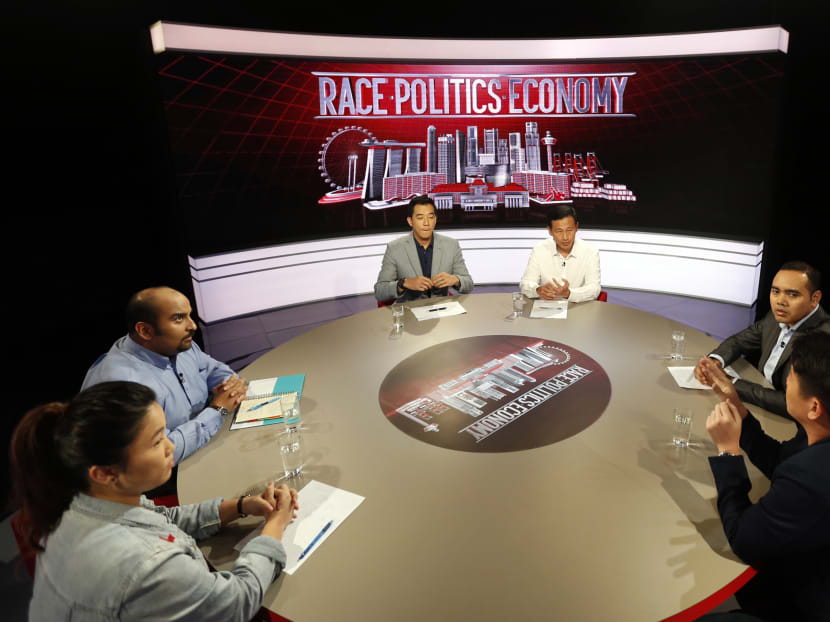Post-NDR forum sees discussion on issues of race
SINGAPORE — Youths today may have a superficial understanding of racial harmony, believing that sampling the delicacies of other races embodies multi-racialism, conceded Acting Minister for Education (Higher Education and Skills) Ong Ye Kung at a post-National Day Rally forum, where he addressed issues concerning race.

Race issues dominated the televised forum on race, politics and the economy on Channel NewsAsia on Monday (Aug 29). Photo: Ernest Chua
SINGAPORE — Youths today may have a superficial understanding of racial harmony, believing that sampling the delicacies of other races embodies multi-racialism, conceded Acting Minister for Education (Higher Education and Skills) Ong Ye Kung at a post-National Day Rally forum, where he addressed issues concerning race.
“Some students once told me, ‘We all eat each other’s food and we’re multi-racial.’ I said no, if we face difficult issues like your incense paper flies into another person’s house – whether it’s Malay or Indian – and they’re not comfortable, then what do you do? There are tensions on the ground,” he said, noting that the students had no answer to that.
Race issues dominated the televised forum on race, politics and the economy on Channel NewsAsia on Monday (Aug 29), with participants raising the topic of ensuring minority representation in the Elected Presidency (EP), and whether Racial Harmony Day has been effective in teaching students what racial harmony means.
Participants included Nominated Member of Parliament Kuik Shiao-Yin, Mr Pravin Prakash, Associate Research Fellow with the Centre of Excellence for National Security at the S Rajaratnam School of International Studies and Mr Jeffrey Salleh, the immediate past president of Malay/Muslim community group Mendaki Club.
Responding to Ms Kuik’s question on racial harmony, Mr Ong said he agreed it could be superficial on one level. But even as Singaporeans grapple with race and identity issues, they should “not to be too hard on (themselves)”, given how relatively young the Republic is. Reciting the pledge and celebrating Racial Harmony Day were “little steps day in day out” that seeped into the subconscious of youths, he added.
On the discussion of identity in Singapore, Mr Ong said: For now, it sounds a bit superficial – Singlish, hawker food. But I think something deeper is also developing.”
On the impending changes to the EP — among them steps to ensure that minorities in the Republic get elected as President from time to time — Mr Salleh said as a Malay he “wouldn’t want a token president”, as it could jeopardise meritocracy here.
In response, Mr Ong cited a recent CNA-Institute of Policy Studies survey that showed Singaporeans preferred to vote along racial lines. This was human nature, he pointed out.
Noting that the commission leading the EP overhaul has submitted its recommendations — a white paper will be issued on the issue — Mr Ong said: “I would watch out for this bit of details – is the system that’s recommended a forced rotation? If it is, then we’re not giving ourselves a chance to evolve. Or is it meant to be a safeguard? And if it’s designed as a safeguard, does the same stringent criteria still apply?”
He added that the President is meant to represent Singapore as head of state, and as such, all races should have a chance to be elected.
Asked about the Chinese, Malay, Indian and Others (CMIO) race classification model, the minister acknowledged it was a “reductive” way of describing Singaporean identity. However, given how complex each race was, refining the model may not be practical, he said, adding that ethnicity is part of Singapore’s cultural identity.
On political discourse in Singapore, Mr Ong noting the extreme ideological differences in politics in the United States and in the United Kingdom, said he hoped Singapore does not go down that path. “Our Opposition in Parliament, we can come together on many things. So long as we are debating in the middle, we all agree which direction Singapore ought to go towards. Some things we’ll disagree and I think these are things we can debate within Parliament,” he said.
Singaporeans, he added, should speak openly on issues. “In terms of what you can say, so long as you don’t insult other religions (and you) say it with respect, I’ve not seen anyone get into trouble, where from a position of respect, (you) talk openly about certain problems,” he said.






